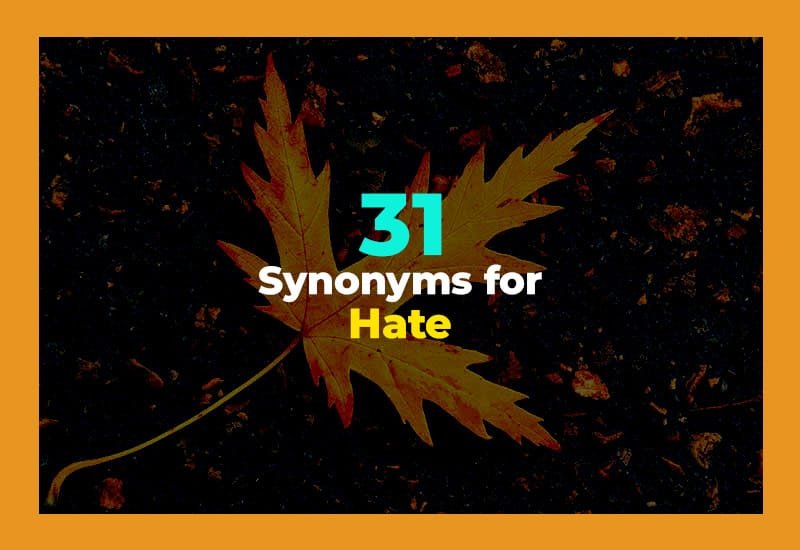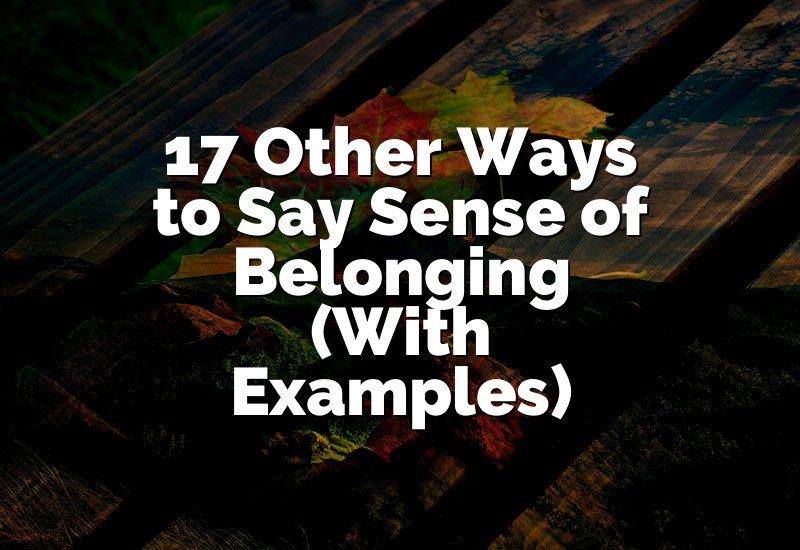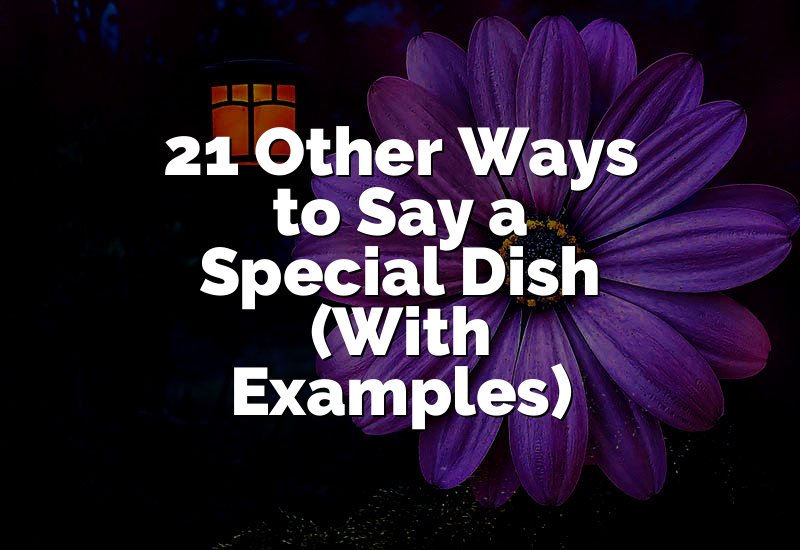Ever wondered if there's a stronger or more expressive way to say hate? In this article, we'll explore 31 powerful synonyms like detest, loathe, and abhor, showing how to use them in different contexts. Whether you're writing, speaking, or expressing your feelings, this guide helps you pick the perfect word for any situation.
Abhor
Abhor is one of the strongest ways to express hatred. It conveys deep disgust and moral opposition, making it ideal when you despise something not only personally but ethically. Writers, speakers, and anyone emphasizing intense dislike often choose this word to show serious aversion. It works well in formal or serious discussions, especially when describing injustice, cruelty, or behavior that shocks your values.
- I abhor cruelty towards animals.
- She abhors dishonesty in the workplace.
- He abhors being late for important meetings.
Detest
Detest is perfect for situations where dislike is strong but not as intense as abhor. It communicates strong personal revulsion or dislike and is widely used in both spoken and written forms. People often use it to show clear boundaries of what they won't tolerate or accept. It's effective when expressing preferences, aversions, or moral disagreements without sounding overly formal.
- I detest eating mushrooms.
- She detests rude behavior in public.
- He detests unfair treatment at work.
Loathe
Loathe communicates an extreme form of dislike that's emotional and personal. It's ideal for expressing disgust towards people, habits, or actions that deeply irritate you. Writers, teachers, and speakers use it to make strong statements about what is intolerable. Unlike casual dislike, loathe carries weight and ensures the audience understands the depth of your feelings.
- I loathe waking up early on weekends.
- She loathes traffic jams in the city.
- He loathes dishonesty from his friends.
Despise
Despise is great for expressing disdain with moral or personal judgment. It works when you want to show superiority over someone's actions or character. It's frequently used by writers, critics, and speakers when highlighting contempt for behavior, attitudes, or ideas that are unacceptable or harmful. Despise can also create dramatic emphasis in storytelling.
- I despise cheaters in competitions.
- She despises people who gossip constantly.
- He despises laziness in his team.
Dislike
Dislike is a straightforward, everyday term for hatred that's less intense. It's perfect for casual conversations, expressing minor irritation, or pointing out preferences without extreme emotion. Teachers, friends, and colleagues use it to communicate personal boundaries politely. While it's mild, it still effectively communicates that something or someone is unwelcome.
- I dislike spicy food.
- She dislikes loud noises in the office.
- He dislikes waiting in long lines.
Revile
Revile expresses hatred through verbal attacks or strong criticism. It's commonly used in writing, speeches, and debates when condemning someone's actions or ideas. It's suitable for journalists, writers, or public speakers aiming to show moral outrage. Revile emphasizes disapproval in a confrontational way, making it impactful in serious discussions.
- The critics reviled the movie for its poor plot.
- She reviled the unfair treatment of employees.
- He was reviled for lying to the public.
Execrate
Execrate is a formal word for expressing extreme hatred, often with an emotional or moral element. Scholars, writers, and speakers use it to describe abhorrence toward actions, ideas, or events considered deeply wrong. It carries a dramatic tone, making it suitable for literature, history discussions, or serious commentary.
- People execrate acts of terrorism.
- She execrates dishonesty in leadership.
- He execrates corruption in government.
Disdain
Disdain communicates a mix of dislike and superiority. It's perfect when you want to show contempt for someone or something you consider beneath you. Professionals, writers, and critics often use it in evaluations, reviews, or social commentary. Disdain signals that the subject is unworthy of respect or attention.
- She looked at the messy room with disdain.
- He expressed disdain for cheating in exams.
- I feel disdain toward arrogant people.
Scorn
Scorn conveys strong contempt combined with ridicule. It's effective when criticizing actions, ideas, or people publicly. Writers, speakers, and social commentators use it to emphasize moral or intellectual superiority. Scorn is ideal when you want to make it clear that certain behaviors are unacceptable or ridiculous.
- She scorned the fake promises.
- He scorns unfair treatment in the workplace.
- They scorned the idea of cheating.
Contemn
Contemn is a formal word for showing strong hatred or disrespect. It's less common but very effective in academic or literary contexts. People use contemn to express moral opposition or ethical rejection, often toward ideas or behaviors considered unworthy. It's suitable for essays, debates, and serious discussions.
- The leader contemned corruption in politics.
- She contemned rude behavior in public.
- He contemned dishonesty among peers.
Spurn
Spurn refers to rejecting or refusing with contempt. It's commonly used in social, professional, or literary contexts. People often use spurn when they want to emphasize dismissive rejection, whether it's an idea, offer, or person. Writers and speakers use it to show both refusal and disdain simultaneously.
- She spurned the offer without hesitation.
- He spurned their attempts to deceive him.
- They spurned unfair treatment in the organization.
Reject
Reject is a practical synonym for hate, especially in professional or social situations. It indicates strong refusal or disapproval. It's suitable for workplaces, personal boundaries, and decision-making contexts. Reject communicates that something is unacceptable or unwanted.
- I reject lies and deceit.
- She rejected the unfair proposal.
- He rejected toxic relationships.
Shun
Shun involves deliberately avoiding or keeping away from someone or something disliked. It's often used in social, professional, or personal contexts. Shun signals clear boundaries and intentional avoidance, showing strong disapproval without confrontation.
- They shun people who break rules.
- She shuns junk food for health reasons.
- He shuns negative influences in his life.
Abominate
Abominate expresses intense hatred with moral or emotional weight. It's used in formal writing, speeches, or discussions emphasizing deep aversion. Abominate signals strong emotional and ethical opposition, making it suitable for moral debates, critiques, or literature.
- I abominate dishonesty in all forms.
- She abominates cruelty to animals.
- He abominates corruption in society.
Repudiate
Repudiate is ideal when rejecting something with strong disapproval. It's used in legal, academic, and professional contexts as well as moral debates. It conveys both emotional and rational refusal, showing that something is unacceptable.
- She repudiated false accusations.
- He repudiated the unethical practices.
- They repudiated outdated traditions.
Antagonize
Antagonize means to actively provoke dislike or hostility. It's often used when describing behavior that creates conflict or resentment. Teachers, leaders, and writers use it to show the consequences of irritating or offending others.
- His comments antagonized the crowd.
- She antagonized her coworkers with constant complaints.
- The policy antagonized the public.
Disfavor
Disfavor communicates mild dislike or disapproval, often in a social or professional context. It's used when something is unacceptable or frowned upon, signaling that it doesn't meet standards or expectations.
- The committee viewed his actions with disfavor.
- She expressed disfavor toward dishonest practices.
- He worked in disfavor after the scandal.
Resent
Resent is a personal, emotional form of dislike. It's perfect for situations involving perceived unfair treatment or frustration. People commonly use it in relationships, workplaces, or social commentary. Resent communicates emotional discomfort and irritation toward someone or something.
- I resent being blamed for mistakes.
- She resents his rude behavior.
- He resents working overtime without pay.
Be Averse To
Be averse to signals dislike or unwillingness to engage with something. It's often used in professional, personal, or social contexts to express reluctance or disapproval. It's subtle yet effective when showing boundaries or preferences.
- I am averse to unnecessary risks.
- She is averse to conflict at work.
- He is averse to unhealthy food.
Oppose
Oppose shows active resistance or disagreement. It's commonly used in debates, politics, or decision-making situations. Oppose communicates that you are against something firmly and can take action to prevent it.
- They oppose unfair taxation.
- She opposes the new regulations.
- He opposes cheating in exams.
Enmity
Enmity represents deep-seated hatred or hostility between people or groups. It's used in formal writing, history, or literature to describe lasting conflict. Enmity emphasizes emotional and historical depth, often implying tension or rivalry.
- There was long-standing enmity between the two families.
- She felt enmity toward her rival.
- The nations had enmity for decades.
Animosity
Animosity refers to strong hostility or hatred, often visible through actions or words. It's used in social, professional, or personal contexts to describe tense relationships. Animosity highlights ongoing resentment or conflict.
- He felt animosity toward his competitor.
- She expressed animosity after the betrayal.
- There was animosity between the two teams.
Hostility
Hostility conveys aggressive dislike or opposition. It's commonly used in professional, social, or political contexts. Hostility indicates tension, confrontation, or potential conflict, making it more active than passive dislike.
- The employees showed hostility toward new management.
- She faced hostility during negotiations.
- Hostility erupted between rival groups.
Malice
Malice is hatred with the intent to harm. It's perfect for legal, literary, or social contexts describing ill will. People use it to explain motivations behind harmful actions, emphasizing moral wrongdoing.
- He acted with malice against his enemies.
- She spread rumors with malice.
- The attack was driven by malice.
Rancor
Rancor is deep, bitter hatred, often long-lasting. It's common in literature, personal, or professional narratives to describe lingering resentment. Rancor highlights emotional intensity and unwillingness to forgive.
- She spoke with rancor about the betrayal.
- He held rancor toward his former partner.
- The debate ended with rancor.
Aversion
Aversion describes strong dislike or avoidance. It's widely used in social, personal, and professional contexts to signal boundaries or discomfort. Aversion helps communicate preferences clearly.
- I have an aversion to smoking.
- She has an aversion to dishonesty.
- He feels aversion toward crowded places.
Loathing
Loathing expresses extreme, personal hatred. It's often emotional and visceral, perfect for emphasizing strong disgust or rejection. Writers, speakers, and individuals use it to convey intensity.
- She felt loathing toward the corrupt official.
- He had loathing for unhealthy habits.
- They expressed loathing for unfair treatment.
Detestation
Detestation indicates a strong feeling of hatred. It's suitable for emotional, moral, or social contexts. People use detestation to emphasize disapproval or aversion strongly.
- I feel detestation toward cheating.
- She expressed detestation for lies.
- He has detestation for injustice.
Odium
Odium represents general hatred or disgrace attached to someone or something. It's often used in historical, literary, or formal contexts. Odium communicates disapproval widely recognized by others.
- He brought odium upon his family.
- The policy incurred public odium.
- She faced odium for her actions.
Distaste
Distaste refers to mild dislike or aversion. It's commonly used in social, personal, or professional contexts to express subtle rejection. Distaste conveys preference without extreme emotion.
- I have distaste for gossip.
- She felt distaste at the rude comments.
- He expressed distaste for unclean environments.
Begrudge
Begrudge means to dislike someone having something you want or resentment toward others. It's ideal for personal, social, or professional scenarios. Begrudge communicates envy mixed with disapproval.
- She begrudged his success.
- He begrudged their happiness.
- They begrudged the recognition he received.
| Synonym | Meaning | Example |
|---|---|---|
| Abhor | To regard with disgust and hatred | I abhor cruelty towards animals. |
| Detest | To dislike intensely | I detest eating mushrooms. |
| Loathe | To feel intense dislike or disgust | I loathe waking up early on weekends. |
| Despise | To feel contempt or scorn for | I despise cheaters in competitions. |
| Dislike | To not like someone or something | I dislike spicy food. |
| Revile | To criticize with hatred | The critics reviled the movie for its poor plot. |
| Execrate | To feel or express intense loathing | People execrate acts of terrorism. |
| Disdain | To regard with contempt | She looked at the messy room with disdain. |
| Scorn | To express contempt or ridicule | She scorned the fake promises. |
| Contemn | To treat with contempt or hatred | The leader contemned corruption in politics. |
| Spurn | To reject with disdain | She spurned the offer without hesitation. |
| Reject | To refuse to accept | I reject lies and deceit. |
| Shun | To deliberately avoid | They shun people who break rules. |
| Abominate | To detest strongly | I abominate dishonesty in all forms. |
| Repudiate | To reject with disapproval | She repudiated false accusations. |
| Antagonize | To provoke hostility | His comments antagonized the crowd. |
| Disfavor | Mild disapproval or dislike | The committee viewed his actions with disfavor. |
| Resent | To feel bitterness or anger | I resent being blamed for mistakes. |
| Be Averse To | To have strong reluctance or dislike | I am averse to unnecessary risks. |
| Oppose | To be against something | They oppose unfair taxation. |
| Enmity | Deep-seated hatred | There was long-standing enmity between the two families. |
| Animosity | Strong hostility | He felt animosity toward his competitor. |
| Hostility | Aggressive opposition | The employees showed hostility toward new management. |
| Malice | Desire to harm others | He acted with malice against his enemies. |
| Rancor | Bitter resentment | She spoke with rancor about the betrayal. |
| Aversion | Strong dislike | I have an aversion to smoking. |
| Loathing | Extreme hatred | She felt loathing toward the corrupt official. |
| Detestation | Strong dislike | I feel detestation toward cheating. |
| Odium | General hatred or disgrace | He brought odium upon his family. |
| Distaste | Mild dislike | I have distaste for gossip. |
| Begrudge | To resent or envy | She begrudged his success. |

Final Thoughts
Expanding your vocabulary with hate synonyms makes expressing emotions more precise and impactful. From mild dislike to intense loathing, each word adds depth to your communication, storytelling, or writing efforts. Choosing the right term helps convey feelings accurately, making your message more persuasive and relatable in any context.









